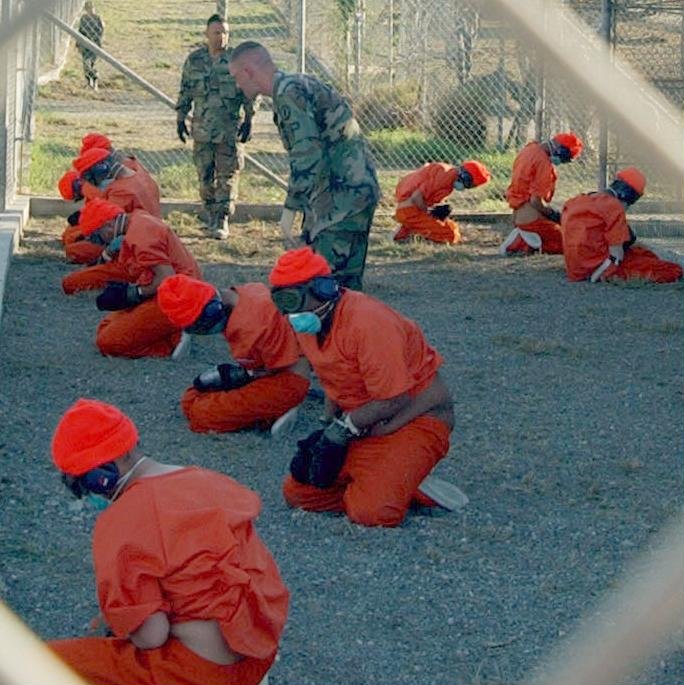Torture is prohibited under international law, and even some countries have laws against it. Yet, there is still a debate as to what defines torture.

source
The UN sees torture as a serious violation of human rights enough to condemn it but not deem it illegal. In the U.S., the fear of "terrorism" has many people blindly defend the methodology to extract information from people who are seen as a possible threat.

source

source
In many television shows like Homeland or 24, the message is that torture is sometimes necessary. The justification is that if physical or psychological harm can extract secrets to save lives, then it's worth it.
Shane O’Mara has long been an outspoken critic against torture. His book "Why Torture Doesn't Work - The NeuroScience of Integration" deals another blow to the intelligence networks that use these "enhanced interrogation" tactics to get information.
Torture doesn't work the way torturers assume it does, even for the "lighter" 'white torture' methods (assaults on our core psychological, neural, and physiological functioning).
Some of them used by the CIA and other agencies are "oxygen deprivation through near-drowning and suffocation; shackling and stress positions; extended sleep deprivation; freezing, cooling, and starving the body and brain; overloading the senses with loud noise and bright lights; drip-feed assaults on personal dignity through facial slaps and holds, enforced nakedness, and the imposition of adult diapers; the slow destruction personhood through social isolation, social deprivation, and a deliberate program of deindividualisation; confinement in cramped boxes; predator threat using guns, drills, and attack dogs; pretended assaults on the loved ones of the captive."

source
The way the brain reacts to fear, extreme temperatures, starvation, thirst, sleep deprivation, waterboarding, stress positions, and freezing water create stressors and problems for memory, mood and thinking.

source
Those who are put through these conditions will produce unreliable information which is counterproductive to intelligence purposes. If you want information you can depend on to save lives, then torture is not the method to obtain it.
Even Napolean recognized this: “It has always been recognized that this way of interrogating men, by putting them to torture, produces nothing worthwhile.”
Torture doesn't make people want to cooperate through reasoning with them. Instead it creates panic, dissociation, unconsciousness and long-term neurological damage.
The stressors applied will attack the fabric of the brain with the loss in brain tissue with respect to memory. The effects of torture create the same symptoms as post-traumatic stress disorder and other related conditions. Chronic and extreme stress will affect brain regions that deal with intention and general behavioral control. Studies on combat soldiers, patient groups and the normal population show that stressors compromise memory, mood and cognitive function.
O'Mara recounts the story of a 60-year-old torture survivor in Cambodia, reported by an intellgence officer:
“He told his interrogators everything they wanted to know, including the truth. In torture, he confessed to being everything from a hermaphrodite, and a CIA spy to a Catholic bishop and the King of Cambodia’s son. He was actually just a school teacher whose crime was that he once spoke French.”

source
Interrogators will shift towards more extreme torture as they believe a suspect is withholding information or lying about what they are saying. Evidence shows that people who are trained as interrogators become more likely to believe others are lying to them. This makes them less capable of detecting a lie compared to the rest of us.
O'Mara states that torture is “ineffective, pointless, morally appalling, and unpredictable in its outcomes”.
"Torture as an interrogational theory and practice is a complete and utter failure."
The severe stress from physical and psychological torment will impair recall and promote the use of information the torturer is asking about, into their answers. Torture assaults the core of who we are. The integration of our social, psychological and neural functionality gets twisted and broken and people will do anything, and say anything, just to get the torturer to stop. The negative psychological effects do not only apply to the tortured, but also the torturer who is greatly affected by what they have done.
References:
- Why Torture Doesn’t Work The Neuroscience of Interrogation
- The neuroscience of interrogation: Why torture doesn’t work
- Why Torture Doesn't Work
- Torture
- Beyond torture: The future of interrogation
- Why Torture Doesn't Work
- Finally, Science Beginning to Prove Torture Doesn’t Work
If you appreciate and value the content, please consider:
Upvoting  , Sharing
, Sharing  or Reblogging
or Reblogging  below.
below.
2017-01-27, 12:02pm@krnel

Hello @KrNel,
Congratulations! Your post has been chosen by the communities of SteemTrail as one of our top picks today.
Also, as a selection for being a top pick today, you have been awarded a TRAIL token for your participation on our innovative platform...STEEM.
Please visit SteemTrail to get instructions on how to claim your TRAIL token today.
If you wish to learn more about receiving additional TRAIL tokens and SteemTrail, stop by and chat with us.
Happy TRAIL!

Absolutely correct! When subjected to torture the Knights Templar admitted to things that would make a Satanist blush (if possible) only to recant after the charges were eradicated. Every one of them said that the only reason they admitted to anything was to stop the torture and that they would have admitted to anything to make it stop...no matter how untrue! That's what torture gets you- the answers you want, not the truth.
Well said. Thanks for the feedback.
I've always heard.., you can get more tangible information out of a subject with a pack of smokes and a six pack of beer...
LOL
Yaaaayyy, reason!
Thanks for the post.
Torture is inhumane. Interrogations are inhumane. The ones being tortured loose humanity. The ones doing the torture loose humanity. Both reduced to robot slaves of an information driven predetermined state agenda. Information gathered from these emotional manipulations is used in state's jesuitical and circuitous propoganda on the public, which infringes upon public's humanity. Good Times.
Get false confessions, and then use that to invade and murder people... great methodology to get whatever you want. Good times indeed. Thanks for the feedback.
Torture, as a concept, is barbaric, designed to dehumanise an individual to the point of hopelessness and loss of concept of self.
The most effective form, that I have witnessed, is sleep deprivation. This has the effect of making the brain confused in function and blurs the lines of reason and memory. The subject loses the capacity to rely upon themselves.
Nature is full of examples of torture - orcas teaching their pups to hunt for seals, cats toying with prey and keeping them sufficiently alive as to be amusing, foxes rampaging through chickens etc
Torture can work and has been effective.
Guantanamo Bay is in Cuba for a very good reason!
I think there are some pretty rare circumstances where torture might be necessary. I mean we can all think of that one unlikely scenario where we know a certain person has hid a nuclear device in the city somewhere and it must be found before it detonates. If that scenario did happen I would not be opposed to torture. It's not that torture doesnt work, it's just unreliable, particularly if you don't have a certain level of information already. It has to be possible to verify the truth of what is said.
It can provide valid data, but in general it's unreliable and doesn't work, in general ;) There might be specific cases where it might. Thanks for the feedback.
Artificial lifeboat scenarios are a bad way to analyze reality. After all, how can you assume that torture will work in that situation?
Psychology shows the destructive effects of power. Torture in the name of "justice" ramps up the destructive psychological incentives and effects of the Milgram and Stanford Prison experiments a thousand-fold.
You can't assume torture would work in that situation but at that point you have nothing to lose. I'm not saying the scenario is likely, just that if there ever actually was such a situation (time critical, bomb on a timer or equivalent type of situation) then I don't really see what the alternative would be. Pain can certainly make people talk even if it is an unreliable way of getting the truth. But in a situation like this, what was said could be quickly verified. Justice doesn't really have anything to do with it. Torture is for getting information, not justice.
Again, I'm not saying this is a likely scenario but it is a possible one. In MOST real-life scenarios this obviously would not be the case. But then again, waterboarding was only (supposedly) used on two or three people out of hundreds of captives. I am not sure of the details but supposedly at least in one case they got info that stopped a major terrorist attack.
So I don't think it's fair to make a blanket statement that torture doesn't work. I would say that it works, but only under a very specific set of circumstances which are uncommon at best.
Can you trust the assurances of the same government that has repeatedly lied about everything else related to its actions in the name of "national security"?
Trust is too strong of a word but I think this has come from multiple sources. How do you know people were waterboarded at all if you don't trust the government about it?
Great post! (;